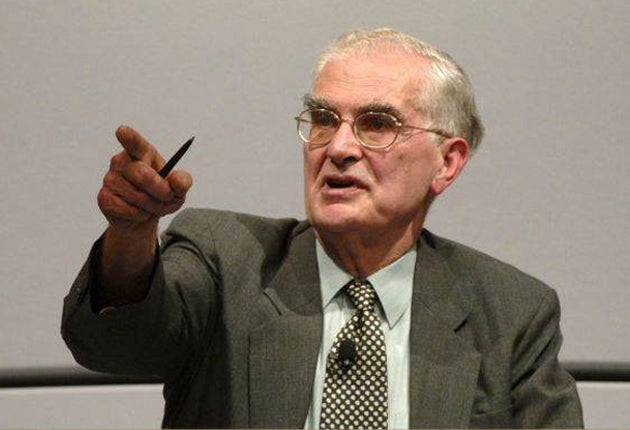Climate row: backing for scientists
Panel finds no evidence of impropriety in East Anglia unit after integrity of researchers was questioned

A distinguished panel of independent scientists has given a resounding vote of confidence in the credibility and integrity of the key studies into climate change that have emerged over the past 20 years from the embattled Climatic Research Unit (CRU) at the University of East Anglia.
The panel, chaired by Lord Oxburgh, a geologist and former rector of Imperial College London, was asked to review the scientific papers and methodology of the CRU following the theft of university emails, the leaking of which suggested a possible conspiracy to subvert data in order to support the case for man-made climate change.
Lord Oxburgh's investigation found no evidence to suggest that the CRU scientists had acted improperly or dishonestly. It found the unit's overall conclusions were sound but it criticised the CRU for not using the best statistical tools to analyse the data – although this misjudgement did not alter the overall results and conclusions.
Questions about the integrity of the CRU emerged after the theft of internal emails last year, which were released on the internet just before the Copenhagen climate summit in December. Climate "sceptics" argued that the emails demonstrated that Professor Phil Jones, the CRU's director, was prepared to fiddle the data in order to prove that the world was warming at an unprecedented rate.
Lord Oxburgh and his six co-panellists reviewed 11 representative studies going back 20 years as part of their independent investigation, ordered by the University of East Anglia. It is the second of three inquiries into what became known as "climategate", and it concentrated on the scientific integrity of the research in question.
"We found absolutely no evidence of any impropriety whatsoever. That doesn't necessarily mean that we agree with all of their conclusions but that was not the point. We were absolutely satisfied that these people were doing their job fairly and honestly," Lord Oxburgh said.
"As far as we could see all of the conclusions were honestly and sensibly arrived at. We had no reason to question the conclusions, we had no reason to believe that they were reached by dishonest means," he said.
The panel, composed of leading professors in Britain, the United States and Switzerland, investigated two broad areas of CRU research. One was the interpretation of tree-rings – dendrochronology – extending over 1,000 years, and the other involved direct temperature measurements over the past few centuries from weather stations around the world.
The panel's seven-page report, prepared in one month, found that the CRU had made every effort to ensure that the work was carried out properly and that appropriate caveats and uncertainties were included in the published work. "We are satisfied that the CRU tree-ring work has been carried out with integrity, and that allegations of deliberate misrepresentation and unjustified selection of data are not valid," the report said.
In regards to the direct temperature measurements, the panel was convinced that the research was fair and satisfactory. "In detailed discussion with the researchers we found them to be objective and dispassionate in their view of the data and their results, and there was no hint of tailoring results to a particular agenda," it said.
"We saw no evidence of any deliberate scientific malpractice in any of the work of the CRU and had it been there we believe that it is likely that we could have detected it. Rather we found a small group of dedicated if slightly disorganised researchers who were ill-prepared for being the focus of public attention."
Professor David Hand, an expert in statistics at Imperial College, said that the CRU relied heavily on the statistical interpretation of "tough data" and that it could have used better techniques had the climate scientists kept themselves abreast of developments in statistics. "In reading the [scientific] papers, the CRU have to be commended because of the many cautionary comments and qualifications they make in those papers," Professor Hand said.
"There is no evidence at all of anything underhand, the opposite if anything, in that they have brought out in the open the uncertainties associated with what they are doing. That doesn't mean that better statistical methods could not have been used, and I suspect they could have been used," he said.
"We're not talking about radically different tools and entirely different approaches, we're talking about slight differences in methods," he added. In any case, this probably did not affect the overall conclusions of the research, Professor Hand said.
Lord Oxburgh said that it was important to investigate the allegations independently because of their seriousness for the scientists involved, as well as the University of East Anglia.
"If there are serious and sustained allegations about scientific impropriety against a researcher or a group of researchers those people are unlikely to work as researchers again. This was very serious, and had they been found to have misrepresented their results they would almost certainly have been dismissed," he said.
Edward Acton, chancellor of the university, said it had been a horrendous experience for Professor Jones and a turbulent time for the CRU. "We have had months of vilification against our most precious asset of scientific integrity which, as this report confirms yet again, was totally unjustified," Professor Acton said.
The last inquiry into the emails themselves is due to report at the end of May.
Join our commenting forum
Join thought-provoking conversations, follow other Independent readers and see their replies
Comments
Bookmark popover
Removed from bookmarks